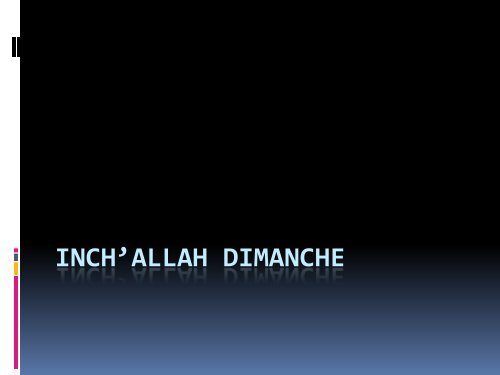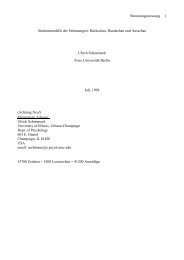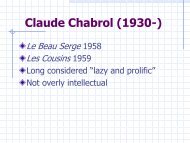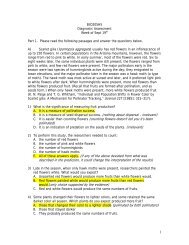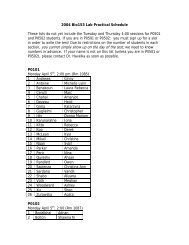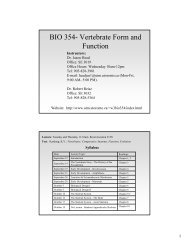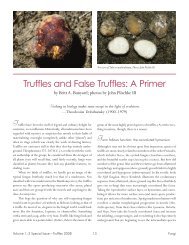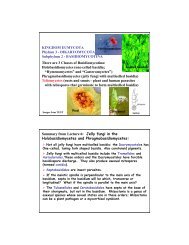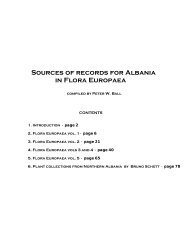INCH'ALLAH DIMANCHE
INCH'ALLAH DIMANCHE
INCH'ALLAH DIMANCHE
Create successful ePaper yourself
Turn your PDF publications into a flip-book with our unique Google optimized e-Paper software.
INCH’ALLAH <strong>DIMANCHE</strong>
Yamina Benguigui (1957-)<br />
Born in Lille, France<br />
From a Kabyle or Berber family<br />
Beur herself<br />
Verlan for Arabe<br />
Politically active – Socialist party<br />
Documentaries<br />
Women of Islam 1994<br />
Mémoires d’immigrés, l’héritage maghrébin 1997<br />
Result of 350 interviews conducted with immigrants
Inch’Allah Dimanche (2001)<br />
First fiction for Benguigui<br />
But largely autobiographical<br />
Her family’s immigrant experience<br />
Broke temporarily with her father because he<br />
did not support her chosen profession
A story of immigration<br />
Exile<br />
Clash of cultures<br />
Integration: “taking root”<br />
Reconciliation<br />
Emergence of hybridity,<br />
“métissage”
Saint Quentin, Aisne<br />
Small town 58,142 in 2006<br />
Specific architecture<br />
Bricks<br />
Rainy and cold climate<br />
Industrial area drawing immigration<br />
Military cemeteries<br />
Close to German border
Picardy<br />
Strong regional identity<br />
Provincial France<br />
Quiet, traditional<br />
A passer-by to the policeman<br />
“Je t’ai connu tout petiot” (I have known you since you<br />
were a kid)<br />
Northern France<br />
Accent, warmth<br />
Bienvenue chez les Ch’tis by Dany Boon, 2008<br />
Nord-Pas –de-Calais
Zouina, the immigrant<br />
Algerian woman<br />
Torn from her roots<br />
First scene<br />
Leaving Algeria<br />
Leaving her mother<br />
Leaving her extended family – sisters,<br />
cousins etc..<br />
Isolated in France
Home life<br />
Isolation<br />
Husband’s/mother-in-law’s abuse<br />
Neighbours’ prejudice<br />
Language problems<br />
Limited knowledge of French<br />
Conversation between Ahmed and the Pole<br />
Confusion chien/chiendent<br />
Illiteracy
Depiction of Algerian<br />
immigrants’ way of life<br />
Observance of Eid el-Fitr<br />
Celebration of the end of Ramadan<br />
Social order<br />
Women’s place<br />
The mother-in-law<br />
The wife<br />
Warm friendships<br />
Between men<br />
Between women
The mother-in law Aïcha<br />
A powerful figure<br />
Jewelry, henna-painted hands, prayers<br />
Cruel and domineering<br />
Locks away coffee and sugar<br />
Orders Zouina around<br />
Abused in her youth<br />
Perpetuates a system of abuse<br />
Represents the burden of tradition
Hard-working<br />
A family man<br />
“Not a womanizer”<br />
Ahmed<br />
Has support of male friends<br />
“The Pole”<br />
Workers “foyers”
Ahmed’s difficulties<br />
Feels threatened<br />
Cannot<br />
Read<br />
Play the guitar<br />
Comfort his wife<br />
Frustration engenders violence
Male violence<br />
Powerlessness of the immigrant worker<br />
Anger against Zouina’s possible superiority<br />
Destruction of book<br />
Djura The Veil of Silence (1990)<br />
Berber woman living in France brutally attacked<br />
by her brother and sister-in-law for not having<br />
followed traditional role
Zouina’s attachment to<br />
tradition<br />
Expressed in songs and music<br />
Recurrent theme of storytelling<br />
The songs in Arabic and Berber<br />
The Ogre<br />
Her home and children<br />
Care and warmth<br />
Pastry making<br />
Search for Algerian “sister”<br />
The Bouira family
Moving away from tradition<br />
Aïcha’s Ogre tale scares the French child<br />
A happy home can be created in France<br />
Children enjoys the homemade cookies<br />
“Le premier bonheur du jour” sung by Françoise<br />
Hardy<br />
Contentment in simple home life
Emerging feminism of the<br />
1970s<br />
Ménie Grégoire’s talk-show<br />
Friendship with Nicole<br />
A divorcée<br />
Introduces cosmetics, perfume<br />
“Your body belongs to you”<br />
Zouina’s ambivalence<br />
“It is a sin”<br />
Yet tries on make-up and would like to discuss radio<br />
program with Malika Bouira
An escalating rebellion<br />
Listening to radio programs<br />
Le jeu des mille francs<br />
Questions about French culture<br />
Anger towards mother in-law<br />
Physical violence<br />
Fight with Mme Donze<br />
“Flirtation “with the bus driver<br />
Shame - covers her face with flour<br />
Going out on three Sundays in a row
Encounters with the French<br />
working class<br />
The shop owner<br />
Strong accent<br />
Curious but kind<br />
Extends credit<br />
Nicole Briat<br />
A factory worker<br />
Well-meaning
Encounters with the petite<br />
The Donzes<br />
bourgeoisie<br />
Narrow-mindedness, prejudice<br />
“The old Indian woman”<br />
“This is not the Casbah”<br />
Passion for gardening<br />
Les nains de jardin/garden gnomes<br />
Religious hypocrisy<br />
Sign of the cross<br />
Yet common points<br />
Le jeu des mille francs
Encounter with the grande<br />
bourgeoisie<br />
Madame Manant<br />
Educated<br />
Books, speech<br />
Dress code and sense of decorum<br />
Hats, tea<br />
Impeccable manners<br />
Uses “vous” not “tu”<br />
Kind<br />
Shows appreciation<br />
Wants to help
Disastrous visit with Malika<br />
Tradition<br />
“Unfortunately I have three daughters”<br />
Daughter’s arranged marriage<br />
“The devil sent you”<br />
Rejection<br />
Suspicion because Zouina goes out<br />
unchaperoned<br />
Zouira breaks the window pane<br />
Echoes separation from her mother
Beginning of a new order<br />
A break with the past<br />
Taking on responsibility for emigration<br />
Refuses Mme Manant’s help<br />
“To-morrow I will take you to school”<br />
Echoes stranger’s remark in Algiers<br />
“Leave for your children’s sake”<br />
A change in Ahmed<br />
He tells off his mother<br />
Aïcha, the Donzes and the sheep leave
Exposure of many wounds<br />
Exploitation of Algerians at time of<br />
colonization<br />
Beating of servants<br />
Present exploitation of labourers<br />
Deaths on the French side<br />
Colonel Manant<br />
Died in the Atlas mountains, body never found<br />
The military cemetery
A new French Mission to<br />
Mme Manant<br />
Superiority<br />
The policeman<br />
civilize<br />
Wants a reconciliation with the Donzes<br />
Bus driver<br />
Rescues Zouina<br />
The new generation will be educated<br />
“Tomorrow I take you to school”.


